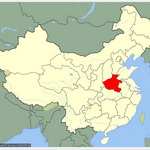

In a special feature published in the run-up to the "two sessions," the EO looked at the challenges
facing six of China's provincial party bosses. We have picked three of these provinces – Guangdong,
Henan and Sichuan – to show the range of issues that China's politicians face in different parts of the
country.
In Guangdong, the country's biggest economy, growth is being deliberately limited as the economy is
restructured and the government deals with the growing threat of social unrest.
Henan is closer to the other end of the spectrum – most of its population still live in the countryside
and the party boss is trying to move millions of them into cities. He just needs to find a way around
central government limits on the amount of land that can be converted for urban use.
Meanwhile, the biggest worry for the governor of Sichuan is his eastern neighbor.
Wang Yang: Guangdong Party Secretary

Age: 57
Came to Office: 2007
Main Political Achievements: Simplifying administration, decentralization, government efficiency,
economic restructuring and technological upgrades, anti-corruption measures and aid to Kashgar in
Xinjiang.
Challenges in 2012: The social situation in 2012 looks bleak.
Challenges in 2012: The social situation in 2012 looks bleak.
Liu Qibao: Sichuan Party Secretary

Age: 59
Came to Office: 2007
Major Political Achievements: setting the goal of making Sichuan an economic powerhouse, leading the
reconstruction after the Wenchuan earthquake, sustaining economic growth, solving the problems of migrant
workers returning to their hometowns and promoting Chengdu's high technology development zones.
Challenges in 2012: After plans for the Chengyu Economic Zone (成渝经济区) were approved in 2011, the
relationship with Chengdu's main rival, Chongqing, will be the biggest challenge.
Lu Zhangong: Henan Party Secretary

Age: 60
Came to Office: 2010
Major Political Achievements: Proposals for the Central Plains Economic Region were approved during his
term. He wants a balance between "agricultural modernization, urbanization and industrialization."
Challenges in 2012: His work in eastern coastal regions has given him experience of urbanization and
industrialization, but he lacks expertise in agriculture.
Guangdong, which accounts for only 1.9 percent of China's land area, generates one eighth of the
country's GDP. As economic growth slows, workers may struggle for basic necessities, such as food and
clothing. In Guangdong, growth is being deliberately limited as the economy is
restructured and the government deals with the growing threat of social unrest.
Sichuan's development plans were thrown off track by severe winter storms and then the Wenchuan earthquake and the provincial party boss was forced to focus on restoration and reconstruction instead. The province's gross domestic product has doubled since 2008, the year of the earthquake, and last year
exceeded 2 trillion yuan.
Its fiscal revenue and level of investment have grown at a similar pace, reaching around 200 billion yuan
and 1.5 trillion yuan respectively.
This year could be perilous for Henan party secretary Lu Zhangong, whose ambitious plan aims togrow the province's urban population by 2 million a year are running into problems due to the lack of urban land.
Henan, which has a population of 100 million, is one of China's main farming regions, producing a quarter
of the country's wheat and a tenth of its grain.


